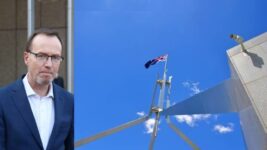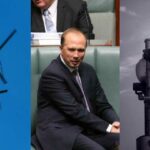Australia’s Mounting Mass Surveillance Regime Must Be Reined In

“A creeping surveillance state”, “the world’s most secretive democracy”, “civil liberties in peril”: these types of phrases are increasingly being used to describe our nation in US headlines.
The examples listed have all appeared whilst the Coalition government has been in power, as well as having been published prior to the onset of COVID-19 paranoia.
So, as the current prime minister continues to bang on about “getting government out of people’s lives”, Scott Morrison and his ministers have actually been drafting national security laws that ensure the reach intelligence has into our daily lives is more pervasive than ever.
The Home Affairs Department has recently announced that as these measures form a “patchwork of laws” within the various pieces of telecommunications and surveillance legislation, it’s now working towards streamlining them so they’re all contained in the one omnibus act.
That these laws are spread out through differing legislation is really no surprise, as, since 9/11, the government has passed over 90 national security bills. And this bipartisan process has been fuelled by the projected fears of terrorism, while it’s also served to erode the rights of every one of us.
But rather than simply legislate to combine all these measures together into one all-pervasive law, which will further serve to facilitate government grip, critics are pointing to the more urgent need for a comprehensive set of laws that would prevent the growing overreach of those in power.
Silencing dissent
“There has been a disturbing confluence of factors happening at the federal level, with much of it also at the state level” NSW Greens MLC David Shoebridge told Sydney Criminal Lawyers.
“What we have seen is a far greater reach of covert surveillance powers together with a series of laws that have made it a crime to speak about it, a crime to be a whistleblower, and also laws that threaten the fifth estate of journalists, if they dare report on it.”
The Home Affairs discussion paper outlining its streamlining proposal states that it intends to combine the covert surveillance measures currently contained in telecommunications, interception and access, surveillance devices and ASIO legislation.
The further laws that Shoebridge refers to are those that have facilitated the political prosecutions of Witness K, Bernard Collaery and David McBride for exposing government crimes, along with those that permit secret trials, press raids and warrantless access to citizens’ metadata.
“That dangerous coming together of an extending reach of a series of secret coercive powers, together with the threat and the use of additional powers allows them to silence, and in some cases prosecute, anybody who dares tell the truth,” Shoebridge underscored.
Ever-increasing reach
The proposal of Home Affairs to collate covert surveillance laws under the one act is not where this all ends, as the department – charged with overseeing intelligence, law enforcement and border security – is on a constant push to enhance its reach.
Currently, there’s a bill before parliament that intends to broaden the powers of intelligence agencies, like ASIO and the ASD, which would include dropping the need for ministerial approval or a court issued warrant to use “covert or intrusive methods” on Australians.
Parliament passed the Integrity and Disrupt Bill last August, which rolled out a three-tiered warrant system that allows agents to gain control of a communications device or an online account to not only search through it, but further to add, copy, alter or delete any information within it.
The passing of the 2018 TOLA Act also raised some eyebrows, as it set up a framework, whereby agents can require communication providers to get beyond their encrypted systems, which includes handing over decrypted data or building backdoor access into a digital platform.
Broadening reach
According to Home Affairs, when the government commenced assembling its huge surveillance network back in the 1960s, it owned telecommunications, but now, faced with a globalised and privatised marketplace, it needs to regain its grip over what it sold off to its corporate mates.
Shoebridge acknowledged that there are legitimate cases where intelligence agencies need the ability to conduct covert surveillance operations, whether that be in relation to genuine national security or terrorism threats, as well as in order to thwart international organised crime networks.
“However, powers like that need to be carefully and independently regulated and that traditionally has happened through the courts,” he continued. “Those controls have largely been sidestepped in the last two decades, handing more of these covert powers to bureaucrats, police and ministers.”
A clear example of this was seen with the passing of the ASIO amendment in 2020, as it removed the need for agents to approach a court for two types of warrants. The attorney general can now authorise a questioning warrant, while a tracking warrant only needs internal authorisation.
“That this is all happening because they’ve sold off our telecommunications network is nothing more than an excuse,” Shoebridge added. “It goes far deeper. It’s about marginalising the role of courts, limiting traditional rights to privacy and empowering the executive to reach into our personal lives.”
A dearth of protections
Following the 2001 New York terror attacks, the United Nations called on all states to enact counterterrorism laws. And the experts explain that the measures that were passed in this country are much broader in terms of volume and reach than other comparable democracies.
“If you attempted to put these types of arrangements in place in countries, like the US, where they have entrenched rights in their constitution, they would be laughed out of parliament,” Shoebridge maintained. “And if they managed to pass parliament, they’d be struck down by the courts.”
Right now, Australia is the only western liberal democracy without some form of bill of rights at the federal level. Indeed, the state of NSW has no comprehensive rights protections either. And the nation’s founding document guarantees merely a handful of – perhaps obscure – rights.
Shoebridge asserts that it is this lack of rights protections at the federal level that has led both major parties when in power to have passed this plethora of national security laws since the turn of the century that “massively empowers the executive as against citizens”.
“One of the lessons we should take from this is how important it is to entrench fundamental rights into our constitution, because without them, these laws only go in one direction,” he concluded, “more and more centralised power, more and more covert surveillance and fewer and fewer rights.”







